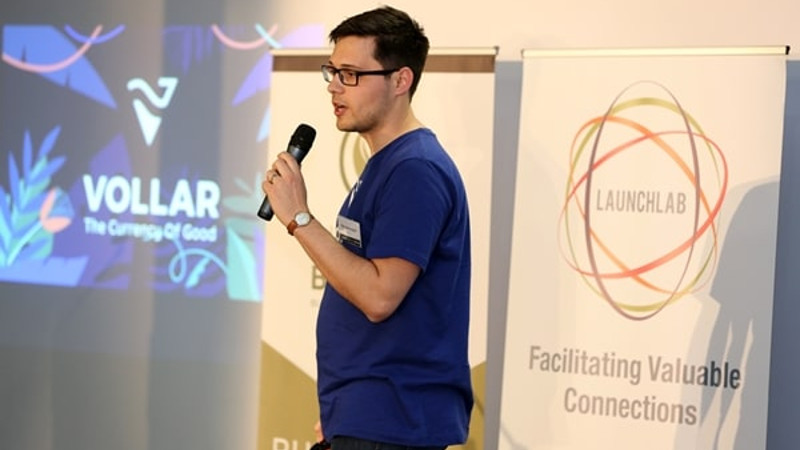We all have them. Those apps we open without thinking. Not because we need anything in particular, but because they feel… safe, in some…
How SA social enterprise startup Vollar landed a R500k investment at Slush

Having completed 2018 with a budget of just R225 000, Stellenbosch-based social enterprise startup Vollar last month secured a R500 000 investment from an angel investor at Finnish tech conference Slush 2018.
Slush, which is held annually in Helsinki, aims to connect startup founders with investors, as well as provide them access to startup networks. Last year’s edition took place on 4 and 5 December.
Vollar founder and CEO Kyle Ueckermann (pictured above) — whose startup has developed a digital token for tracking and rewarding social good — told Ventureburn yesterday (14 January) that he previously lived in Helsinki and earlier last year committed some funding to attend Slush 2018.
He coined the name “Vollar” from the words “volunteer” and “dollar”.
Vollar raised R500 000 from angel investor Daniel James at Slush 2018 in Helsinki, Finland
‘Kind of my Hail Mary’
Evoking a term commonly used in American football, Ueckermann called Slush a kind of “Hail Mary” to secure funding for his startup, which he founded last year in March.
“As a final shot, I would attend Slush and arrange meetings with investors. It paid off,” he explained.
“One angel investor I met with, Daniel James, saw the immense potential in Vollar to bring societal change and wanted to invest right on the spot,” he added.
James, Ueckermann said, is a UK-born investor who previously started a game development company in San Francisco which was acquired by Japanese multinational video game developer Sega.
Ueckermann expects the deal to be finalised later this month, but said he had already received a portion of the funding.
“We have another local investor currently pending which will hopefully result in an additional R500 000 to R1-million,” he added.
In all, he said since launch and including this latest investment, Vollar has raised just over R700 000 in funding. He explained that he, along with his wife Tiialotta, raised the startup’s initial capital (R150 000) by selling his car when he still lived in Hungary.
“We opted to ride bicycles instead, for a few months, while starting up,” he said. Then, around mid-2018 Vollar received a R75 000 grant from the South African Association of Youth Clubs which Ueckermann said gave his startup “the necessary runway” to get Vollar’s proof of concept running.
The R500 000 investment, he said, will be aimed at making Vollar’s platform “commercially ready” which will enable the startup to scale from its pilot community in Kylemore, Stellenbosch.
Volunteer-based currency
Ueckermann previously co-founded Vomo a tech company that created volunteerism apps in the US and was overseeing tech development in Budapest, Hungary when he came up with the idea for a volunteer-based currency.
“I soon saw this idea as a means to empower social change in the poorest communities,” he said. Early last year he resigned and moved back to South Africa with his wife to pursue Vollar, which is currently being incubated at Stellenbosch-based business incubator LaunchLab.
Vollar tracks the time users spend doing social good with local for good organisations, directly representing the time as currency.
“So for one hour volunteering you would earn one Vollar. These can be used directly as a form of payment in a regulated network of participating retailers. One Vollar is valued directly at minimum wage (R20),” explained Ueckermann.
The currency is also embedded with metadata about the work that was done in order to earn it. This anonymised data includes information on what organisation facilitated the work, quality of work, where the work was done as well as basic demographic information.
If someone volunteers and decides to purchase goods at a retailer, Vollar’s platform allows the retailer to qualify for a tax incentive through supporting community development with their corporate social investment.
“In addition (the platform) sees not only the amount of tokens they have gained from trading, but the metadata about the work that was done to generate the tokens, allowing them to know with incredible precision what their corporate social investment has really made possible,” Ueckermann further explained.
Vollar uses a freemium model for services and also charges corprotates an additional transaction fee on the value of trades.
‘Pilot incredibly successful’
Ueckermann said Vollar’s pilot with a soup kitchen in Kylemore, Stellenbosch has been “incredibly successful”. The project helped create 14 jobs while getting volunteers within the community to clean up broken glass in parks in the community.
In addition, the pilot led to the soup kitchen expanding operations from only once a week to three times a week.
“We currently have over 50 registered users in our pilot programme and we continually hear amazing stories of hope from our users who have previously felt disillusioned and hopeless for their future. With Vollar, they see an opportunity to better themselves, better their community and feed their families,” he explained.
Ueckermann plans to make the Vollar platform available to the public in the second of this year.
Featured image: Vollar founder and CEO Kyle Ueckermann (sourced from LaunchLab blog)
Editor’s note (17 January): An earlier version of the article did not include the initial investment of R150 000 that Ueckermann raised from selling his car, along with the R75 000 grant he received from SAAYC.


